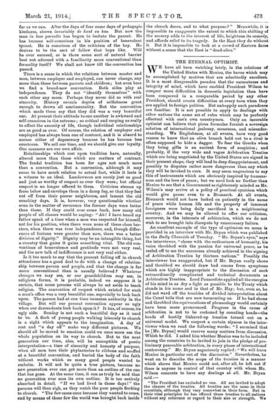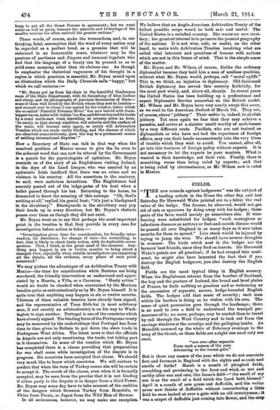THE ETERNAL OPTIMIST.
WE have all been watching lately, in the relations of the United States with Mexico, the havoc whioh may be accomplished by motives that are admittedly excellent.. It is a most disagreeable paradox that the earnestness and integrity of mind, which have enabled President Wilson to conquer more difficulties in domestic legislation than have been conquered in a comparable period by any other President, should create difficulties at every turn when they are applied to foreign politics. But unhappily such paradoxes are familiar. It is not possible to apply to dealings with other nations the same set of rules which may be perfectly effectual with one's own countrymen. Only an incurable optimist can believe that pious formulae furnish a sovereign solution of international jealousy, meanness, and misunder- standing. We Englishmen, at all events, have very good reason to know that an olive branch held out to a rival is often supposed to hide a dagger. To fear the Greeks when they bring gifts is an ancient form of suspicion; and probably, if the very wide and vague Arbitration Treaties which are being negotiated by the United States are signed in their present shape, they will lead to deep disappointment, and possibly to disputes rather more dangerous than any which they will be invoked to cure. It may seem ungracious to say this of instruments which are obviously inspired by humane- ness and the love of peace ; but we need look no further than Mexico to see that a Government as righteously minded as Mr. Wilson's may arrive at a policy of practical cynicism which would give pause even to a Bismarck. At all events, Bismarck would not have looked on patiently in the name of peace while human life and the property of innocent foreigners were being daily sacrificed in a neighbouring country. And we may be allowed to offer our critioism, moreover, in the interests of arbitration, which we do not wish to see brought into disrepute by unnecessary failure.
An excellent example of the type of optimism we mean is provided in an interview with Mr. Bryan which was published in the Daily Chronicle of Tuesday. "Mr. Bryan's eyes," says the interviewer, "shone with the enthusiasm of humanity, his voice throbbed with the passion for universal peace, as be reeled off to me the successes already achieved in the signing of Arbitration Treaties by thirteen nations." Possibly the interviewer has exaggerated, but if Mr. Bryan really shone and throbbed we should draw bad omens from symptoms which are highly inappropriate to the discussion of such extraordinarily complicated and technical documents as Arbitration Treaties. Lord Pauncefote applied all the energies of his mind in as dry a light as possible to the Treaty which stands in his name and in that of Mr. Hay; but, even so, he did not ward off the troubles of divided interpretation about the Canal tolls that are now tormenting us. If he had shone and throbbed the equivocations of phraseology would certainly have been more pronounced. Progress in the cause of arbitration is not to be reckoned by counting heads—the heads of hastily tinkered-up treaties turned out on a universal model. We suspect a certain slyness in the inter- viewer when we read the following words: "I surmised that he [Mr. Bryan] would reserve many matters from discussion. Which he did. I asked him whether Mexico was to be included among the countries to be invited to join in the pledge of pre. liminary peaceable arbitration, in every phase of international controversy." Mr. Bryan sagaciously replied : "We will leave Mexico in particular out of the discussion." Nevertheless, he went on to describe the scope of the treaties in a manner which shows that Mexico could not, after all, be left out if there is anyone in control of that country with whom Mr. Wilson consents to have any dealings at all. Mr. Bryan said :—
"The President has excluded no one. All are invited to adopt the clauses of the treaties. All treaties are the same in their essentials, although they vary somewhat in their form. But in their vital principles he has offered these treaties to all nations without any reference or regard to their size or strength. We hope to get all the Great Powers in agreement ; but we want small as well as great, because the quarrels and bickerings of the smaller nations too often embroil the greater nations."
These words, of course, make the tremendous, and, to our thintLing, fatal, assumption that the word of every nation may be regarded as a perfect bond, as a promise that will be redeemed in an honourable sense, whatever may be the passions of partisans and Jingoes and immoral legaliata who find that the language of a treaty can be pressed so as to yield some meaning other than its obvious one. As though to emphasize the rhetorical vagueness of his thought in a region in which precision is essential, Mr. Bryan seized upon an illustration which the Daily Chronicle calls "happy," but which we call ominous "Mr. Bryan got up from his chair in the beautiful Conference room of the State Department, with its furnishing of bins leather and ebony, and its photographs of previous Secretaries of State-- some of them well loved by the British whom they met in London— and crossed over to where I was seated by the window, below which the co-called' Peaceful Potomac River 'was now lashed with foam- topped waves, laden with 'rotten ice-floe,and driven beyond its banks by *cruel north-east wind, travelling at seventy miles an hour. 'So surely as that stormy condition will subside and the surface of the water will become calm again, so surely will Arbitration Treaties which are made really binding, and the clauses of which are observed conscientiously, pave the way to a permanent means at settling international disputes.' " How a Secretary of State can talk in that way when the unsolved problem of Mexico seems to give the lie even to the soberest word that can now be uttered by the Government is a puzzle for the psychologists of optimism. Mr. Bryan reminds us of the story of an Englishman visiting Ireland, in the days of the Land League, who was assured by an optimistic Irish landlord that there was no crime and no violence in his country. AU the assertions to the contrary, he said, were malicious inventions. The Englishman had scarcely passed out of the lodge-gates of his host when a bullet passed through his hat. Returning to the house, he demanded to know the meaning of this outrage. "Oh, that's nothing at all," replied his genial host; "it's just a blackguard in the shrubbery." Blackguards in the shrubbery may pop their heads up in every direction, but Mr. Bryan's rhetoric passes over them as though they did not exist.
Mr. Bryan went on to say that perhaps the moat important point in the treaties is that they provide in every case for investigation before action is taken :—
" Investigation gives time for consideration, for friendly inter- vention, for discussion, for change of view—for everything, in fact, that is likely to cheek hasty action, with its deplorable conse- quences. That, I think, is the great need of the moment. Any- thing may happen in six or twelve months to bring about a changed view, especially when outside investigators are examining all the details, all the evidence, every phase of each point eoneerned."
We may picture the advantages of an Arbitration Treaty with Mexico—the time for consideration while Bentons are being murdered, the friendly intervention as understood and appre- ciated by a Huerta, a Villa, or a Carranza. "Hasty action" would no doubt be checked when convenient by the Mexican bandits quite as enthusiastically ashy Mr. Bryan himself. It is quite true that anything may happen in six or twelve months. Thirteen of these valuable treaties have already been signed, and the representative of Yuan Shih-kai (a most arbitrary man, if not exactly an arbitrationiat) is on his way to Wash- ington to sign another. Portugal is one of the countries which have already signed. The binding force of the Portuguese treaty may be measured by the undertakings that Portugal has from time to time given to Britain to put down the slave trade in Portuguese West Africa. The latest news is that the officials in Angola are not only sanctioning the trade, but taking part in it themselves. In some of the treaties which Mr. Bryan has completed there is a clause providing that preparations for war shall cease while investigation of the dispute is in progress. Six countries have accepted that clause. We should very much like to know which countries. We will venture to predict that when the turn of Turkey comes she will be certain to accept it. The worth of the clause, even when it M formally accepted, may be seen from the proviso that it is not binding if either party to the dispute is in danger from a third Power. Mr. Bryan may some day have to take account of the realities of the dangers which threaten Turkey from Honolulu, or China from Persia, or Japan from the Wild Men of Borneo.
In all seriousness, however, we may make one exception. We believe that an Anglo-American Arbitration Treaty of the fullest possible scope would be both safe and useful. The United States is a satisfied country. She wants no new terri- tory; her greatest interest is to preserve the present geography of the nations. It is not wise, safe, or useful, on the other hand, to make wide Arbitration Treaties involving what are called vital interests and questions of honour with nations which are not in this frame of mind. That is the simple sense of the matter.
Mr. Bryan and Mr. Wilson, of course, dislike the ordinary diplomatist because they hold him a man of soulless qualities, without what Mr. Bryan would, perhaps, call "moral uplift." This is, we think, an injustice to diplomacy. Old-fashioned British diplomacy has served this country faithfully, for the most part wisely, and, above all, cleanly. In recent years the United States has been building up a professional and expert Diplomatic Service somewhat on the British model. Mr. Wilson and Mr. Bryan have very nearly swept this away, as we read in the American Outlook of March 7th. They are, of course, above "jobbery." Their wilier is, indeed, to abolish jobbery. Yet once again we fear that they may achieve a paradox, and arrive at a sinister result worthy of arch-bosses by a very different route. Pacifists, who are not trained as diplomatists or who have not had the experience of foreign affairs, may run their heads unconsciously into the very hives of trouble which they wish to avoid. You cannot, after all, go into this business of foreign policy without experts. It is not necessary to let the experts be your masters. What is wanted is their knowledge, not their rule. Finally, there is something worse than being ruled by experts ; and that is being ruled by circumstances, as Mr. Wilson now is ruled in Mexico.











































 Previous page
Previous page